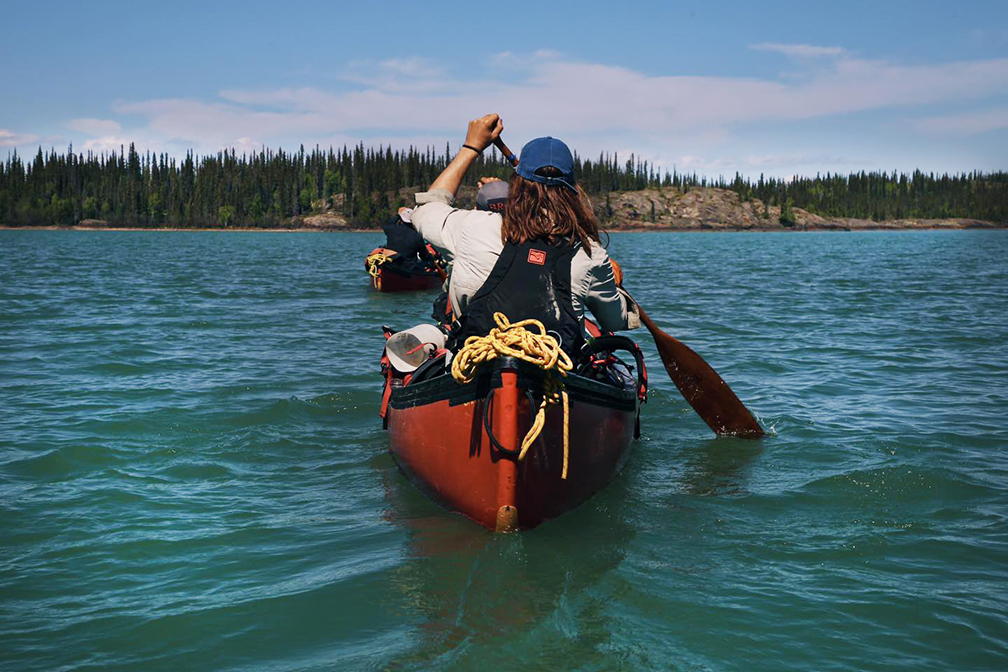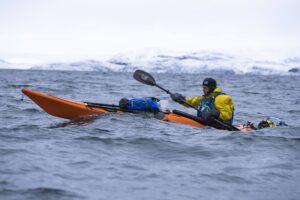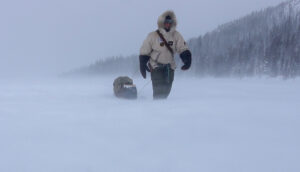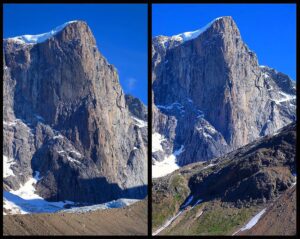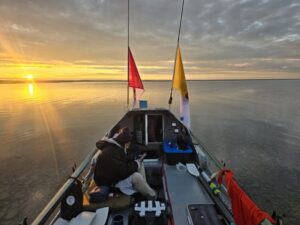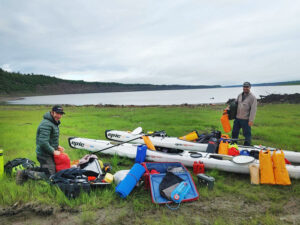The Canada West-to-East team has shape-shifted as it has progressed across the country. Over 106 days, Nicolas Roulx and Catherine Chagnon are the only constants, while their means of travel and teammates change. The pair have just arrived in Baker Lake, Nunavut, having cycled and now canoed 4,200km north of the 60th parallel.
Baker Lake marks the end of the most difficult segment of their journey, a mammoth 2,800km canoe section. It included plenty of portaging and a route change when they arrived at the Little Nahanni River to find it was still frozen. By the end of the canoeing, their team had expanded to six, as Mathieu Beland, Guillaume Moreau, Dominic Roulx (Nicolas Roulx’s brother), and Laurence Garceau joined the party.
Plenty of legwork
The 41-day journey from Great Slave Lake to Baker Lake went relatively smoothly but required a meaty 37 portages.
They left the small community of Lutselk’e on June 25. They immediately faced a tough choice: cross a huge open-water bay but avoid a portage or do a series of eight portages through a chain of lakes that would halve the distance they had to travel. Tired of paddling on the lake, they selected the second option.
“It is a choice we would make differently in retrospect. It was hard on the body, with billions of black flies and a dense, steep forest. We had to put the canoes on ropes up slopes…It was very intense,” Nicolas Roulx told ExplorersWeb.

One of many opportunities for the paddlers to stretch their legs. Photo: Expedition AKOR
After the grind, there was no let-up. “We took the ancestral route of the illustrious and notorious Pike’s Portage, [which took us] from boreal forest to tundra,” Roulx said.
As the name suggests, Pike’s Portage required more legwork. It also brought more wildlife of the blood-sucking variety.
They then joined the Hanbury River, a small, narrow river with plenty of rapids that they could not run in their canoes. This required more portages.
“The portages went through the tundra, so no trees, a bit easier, but windier,” Roulx explained. “The landscapes were astonishing. So many big rapids and big waterfalls. River life as we like it but with incessant portaging.”
They then joined the Thelon River, a fast-moving but smooth-riding river. It eventually gave way to a series of lakes for the 200km run to Baker Lake. After a few frustrating windbound days, they arrived on August 4.
Canoe to sailboat
The next stage of their journey is very different. They’ll leave their canoes behind to join a sailboat crew. The sailboat Anorak has just completed a long journey north from Quebec to meet them.
It’s highly unusual for a sailboat to come inland to Baker Lake, and Roulx says that the locals are excited about its impending arrival.
“They are eager to see the boat. We’ve been so happy to meet with people here. It has been a great, warm welcome. People tell us that it might be the first sailboat coming to Baker Lake in 50 years.”
Roulx and Chagnon will leave their canoe crew behind to join Louis Poliquin, Laurent Poliquin, Hubert Poliquin, and Jean-Michel Vezina sailing east.
The boat will ferry them across Hudson Bay to Pangnirtung on Baffin Island. This should take around 20 days, with a few stops in Inuit communities along the way. From Pangnirtung, Chagnon and Roulx will continue on foot, hiking for 10 days to Qikiqtarjuaq on the east coast of Baffin to finish off their enormous expedition.
